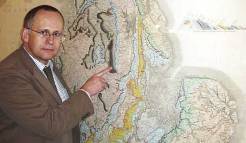
Sometimes the easiest thing to lose sight of is the objective. The real objective, I mean. It is all too easy to fall victim to the beguiling attractions of techniques laboriously learned and slowly mastered, which then become such a pleasure to exercise that we may forget why we are actually doing them. Indeed, the means might eventually become the end. Too much effort has been expended mastering the technique for it to be easily – still less joyfully –relinquished.
Take fly fishing. It’s less effective as a food-gathering technique than a stick of dynamite, but then the occasional grilled trout isn’t the point. How we scorn any upstart technology that designs our hard-won skill out of the equation. Using some gimcrack gizmo to do what you once did with your brain and a pencil, doesn’t seem like real education, somehow. We resent it.
For many geologists, the map is a quasi-sacred object, the foundation of all that we do; and learning how to make them, a mystic-awful process with overtones of the primitive tribal initiation rite. True, to some extent it has already been made easier. Never mind GPS, or satellite or aerial photos - look at those cheaters’ crib-sheets - OS base-maps! Alexander Logie DuToit (1878-1948) mapped tens of thousands of square miles of South Africa singlehanded - including the entire Karoo System from Dwyka tillite to Drakensberg – making his own base-maps as he went. Now that’s the real deal.
But the maps themselves – how we choose to present our data and read it off - is a technology invented by a certain William Smith 200 years ago. Maps may have come a little way since then, but basically it’s still Smith’s toolkit. Today there is, as Martin Smith and Andy Howard
reveal in this issue, so much more we can do using new technology.
Maybe geologists will never quite abandon the paper map – maybe it will keep its status as a fetish object. Remember how people reacted to the Kindle. Ah, they said, what about the heft, the feel and smell of a book? But then they remember luggage surcharges, and soon, practical considerations have outweighed aesthetic ones until the new technology is sold.
And yet books will survive as coveted, top-end objects. We can have books and the Kindle. We can have maps and a 3D NGM.
Let’s just remember why we’re really here.
TED NIELD
Editor